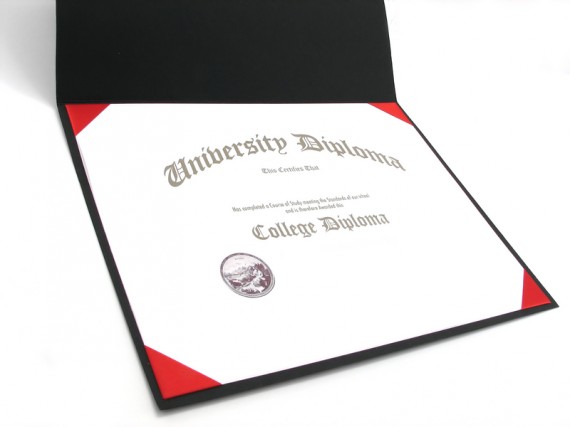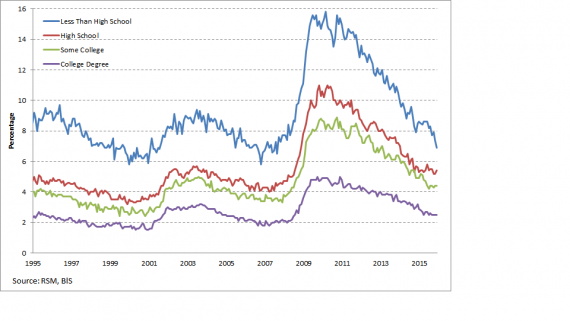Going To College Is Still The Best Thing To Do For Your Future, Graduating Is Even Better
Going to or, preferably, graduating from college makes it far more likely you'll have a job. The numbers don't lie.
In the wake of the release of the November Jobs Report, Joseph Brusuelas, the Chief Ecoomists at RSM US, LLP who was named one of the ‘26 Economists You Should Be Following‘ by The Huffington Post posted this chart based on the new data showing the U-3 unemployment rate based on level of education going back all the way to 1995 (click graphic to enlarge):
The story that the chart tells shouldn’t be all that surprising. Basically, the more education you have, the less likely it is that you’ll be unemployed at any given point in time. By way of comparison, during the height of the Great Recession, the unemployment rate for people who did not graduate High School went as high as 16%, while those with at least a High School Diploma saw their unemployment rate peak at just above 10% at roughly the same time. For people who had at least some college education, their unemployment rate never got higher than roughly 8%, while people who graduated college never saw unemployment rates that went above what appears from the chart to be roughly 4.5-4.75%. Even during the best of economic conditions, the disparity is still quite wide. The unemployment rate for those who never got a High School Diploma didn’t really go below 6% at any point in the last twenty years. For those with a diploma, there were times during the late-90s economic boom when their unemployment rate actually dipped below 4%, and in any case spent long periods at or near the 4% rate until the Great Recession started. Having at least some college education meant that your unemployment rate dipped well below 4% for a good part of the past two decades, and appears to be headed back to its historic norm. Finally, if you graduated from college, you saw periods of time where unemployment actually fell below 2% and, in any case, never went much above 3% until the Great Recession started.
Obviously, these statistics are for groups as a whole and don’t necessarily tell the story of the difficulties faced by some sub-sets of workers regardless of their level of education. During the Great Recession, for example, there were plenty of stories about recent college graduates who had considerable difficulty finding jobs in their fields, or who ended up taking jobs in fields where their education seemingly wasn’t all that relevant to what they were doing on a daily basis. Additionally, the chart itself just speaks to the fact of whether or not someone is employed full-time, not whether they are being paid well or what the status of benefits like health insurance might be. Nonetheless, we know from other statistics that people who are better educated are also paid better and have better earning potential over time, so while the generation of college graduates who had the misfortune to get out of school in the midst of the Great Recession and the recovery that has slowly followed had major difficulties they have, on average, had it better than those who didn’t graduate, those who didn’t go to college, and most certainly those who didn’t even graduate from High School.
All of this goes to an argument that has been popular lately, and one which I have been guilty of making myself, that college education outside of the STEMs and fields that lead to graduate school aren’t worth what students are paying for them. These statistics would seem to make clear that this isn’t necessarily true and that, at the very least, you’re more likely to have a job if you’ve graduated college than in any other circumstances. Certainly, there are individual anecdotes on both sides of the argument about people without a complete education who have become hugely successful and people who graduated college who aren’t doing well at all. Those clearly seem to be the exceptions rather than the rule, though, and the efforts to disparage college education by pointing to people like Bill Gates and Mark Zuckerberg, who have become hugely successful notwithstanding the fact that they never graduated college, don’t really hold water. Those two men, though, are clearly the exception rather than the rule. On balance, going to college is the best choice you can make for your future, and that’s not likely to change any time soon.







I went to college in the mid to late 60s at a State school. It was cheap then and I could easily pay for it with a summer job and a part time job during the school year. I graduated with no debt in 1968. This was during the Vietnam war and not a great time to graduate. I was drafted almost immediately but after basic training I was offered a job by the Defense Intelligence Agency because of my education and that kept me out of the swamps of SE Asia. When my DIA contract was up I returned to the United States from Europe and my degree in Physics landed me a job in the hi Tech industry as an Engineer. I had a long and satisfying career until my retirement. That’s not to say there were not difficult times, the tech industry is very up and down and there were layoffs.
I had 2 sons. My oldest son attended a community college but never graduated. He is in his mid 40s now and has had a successful career with Nike.
My youngest son did graduate from college with a degree in History and Special Education. He graduated with a lot of student debt but took a job with a school district in Hawaii that not only paid off his student debt but financed his Masters Degree. He is now teaching in Singapore.
Doug, that’s because lazy HR idiots use the possession or absence of a college degree as an easy way to filter resumes.
I know enough people who never bothered to get a college education but who trained on their own to rely on the college/non-college distinction.
Education has value beyond job training. I am the same age as Ron Beasley (999 years), and I also self-financed by working summers and kitchen work during the school year. I entered a STEM career, but I took courses that were outside the straight job training path in philosophy, history, and literature. Life is not just having a job. My personal and professional life was improved by the broader education I had. Actually, the campus experience was important in my life; I was not just a binge drinking 19 year old, but I was learning life lessons.
I don’t think that there is some straight path for success in life. I don’t think that you get on a train at reaching 18 years of age that unfailingly drops you off at your death bed after a successful ride. Learn to learn; learn to love learning. Get educated.
The NYT published a summary of labor market data periodically and the numbers bear all of this out – that is, the lowest unemployment rate, no matter how you analyze the data , is for those people who have at least one college degree.
People who tell us that a college degree is not necessary to succeed, or that is a devalued asset and not worth the investment, are whistling as they walk through the cemetery and past the graveyard mines. Yes, there are well known examples of people, prominently in the tech world, who made their fortune after having left college without graduating, but those are lottery odds. Going to college does not guarantee that you will succeed, however it certainly positions you better in the labor market than not having that college degree.
This is probably unique to my specific department in my specific company, but for us, college is nice…but expensive.
Military is better. We get the technical know-how, the due-diligence discipline, a little esprit de corps, and they’re not asking for the kinds of salaries that would make it difficult to hire them.
It would be interesting to see a version of this chart that accounted for military experience, which is a kind of education, even if it’s not often thought of that way.
The problem is, as noted above, that companies looking to hire a freaking receptionist look for a college degree.
A degree that could leave you $100,000 or more in debt as the cost of a college education has skyrocketed in the last two decades.
But I don’t see how any of this changes. Companies, especially larger companies, will continue to rely on a degree as a indicator and college isn’t going to get any cheaper.
@Davebo: It’s also a class indicator. Go to an Ivy-League school and major in something sufficiently impractical and it signifies a) I had enough education and other activities that I was let in, and b) I’m so not worried about money that I can afford to take a college education in something that won’t lead to a trained job.
Remember the “Gentleman’s C” at Harvard? You went there because everyone in your family went there and the student clubs were where you made all the connections you would depend upon for the rest of your life.
Sort of like my experience at Tokyo University….
Boy, this is just some crap advice. I advise people do the opposite. You are much better off going into sales than being another over educated windbag saddled with student debt. Other options include Technology. Cyber security is an area where you just can;t go wrong. I’d either join the military to get the right training or go to a tech school. The worst thing you can do these days is go to a grad school to become a lawyer or get an MBA.
The graph above really only shows supply and demand. Less than a high school degree means you are cut off from a lot of jobs that use a diploma as a threshold. Then you move up with more jobs coming available until you get to a college degree which opens up jobs over the range of thresholds. Yes, as your education increases some employers stop considering you a candidate, because of the assumption you won’t be happy in a low skill job.
They don’t show that beyond the undergraduate, the curves start back up as your specialization in a Masters and, especially, a Ph.D. make you less of a candidate for general jobs.
What we really need to see is how many college graduates are in jobs that should be left to those who didn’t graduate high school, e.g., barista.
Marks, Percy, “Under Glass”, Scribner’s Magazine Vol 73, 1923, p 47
Given what we’ve seen from many on college campuses recently, can we say categorically that a college graduate will learn faster than the non-graduate?
Not to mention, any employer finding a candidate was active in this campus ignorance would be foolish to damage their working environment with such complainers and likely continual grievance filers.
@Slugger: Good points. Another thing to consider about Mr’s Gates and Zuckerberg is that their experience may differ from having been, as they say, “born on third base: (in their cases, “born stealing home” might be a better analogy).
@Davebo: Yeah, no kidding. I read an article recently noting that companies are finding it difficult to hire executive secretaries with college degrees because 95% of workers holding such positions did not need such degrees when they started working in industry. Where I live, law firms are also “preferring”JDs for employment as paralegals and you need a PhD to teach 100-level courses as a non-tenured, non-permanent employee at universities and community colleges.
Biggest complaint I’ve heard about the college graduates who are taking clerical jobs? They can’t type or file fast enough.
@Frank Taylor: I’d agree with you except for the difficulty in getting past the idiocy of Human Resource Departments, who are regularly staffed by the nitwits the company can’t figure out what to do with.
Example: a good friend of mine, background in journalism. Learned his skills from the ground up, worked for years as a UPI radio reporter, broke a lot of stories all over Asia and Africa. Moves back to the US from Japan, and discovers that all his experience is worth zilch. Reason? He doesn’t have a college degree.
P.S. Sometimes the “Ph.D. or bust!” makes sense. I was hired at one start-up in sales because they knew I would would be talking to researchers in the field and could understand what they were talking about.
@al-Ameda:
Those are also, almost to a person, people who came up with their brilliant plans and made the connections they needed to see them through in college.
Now is the the time for the sharp pencil/green eye shade brigade to work out if the cost of subsiding student loans, grants, etc results in higher tax revenue. Might be one argument for increasing public subsidies for say, Elizabethan Folk Dance studies.
on the anecdote level, recall an effort to require Harbor Pilots to have a college degree in addition to a thick folder of Coast Guard certificates and Licenses. For some reason the proponent would not elaborate on why this would be good.
The curse of higher education is student loans. It allowed colleges and universities, both public and private, to build huge bureaucracies that did little if anything to increase education. It also made it possible for the states to reduce funding to public institutions. College is the new high school and should be treated as such.
If debt didn’t matter, then the headline of this post might be true. Factor in debt service and then reevaluate.
Plus as long as Starbucks keeps expanding and bars and restaurants keep opening, Gen. Y/Millennial college and university grads will have some degree of job prospects.
The real issue, obviously, is that of pissing away public money subsidizing useless liberal arts degrees. The engineering major who lands a job at Chiron or Genentech, that’s one thing. The business major who scores a job at Bechtel or CBRE, that’s one thing. The finance major who goes to work at Schwab or Transamerica, that’s one thing. The history, fine arts or philosophy major who moves back home with his parents and tends bar over the weekends, until age 32, while still owing the whole time six figures in debt, that’s a whole other thing.
@Frank Taylor:
I can think of about 3.2 million reasons you’re wrong about that.
Or, to be more relevant, I can think of about 180,000 reasons (the amount of money we pay our first year associates) that you’re wrong. By year 8, they’re bringing home $350k
@HarvardLaw92: Is your firm typical? Does any newly-minted attorney from Podunk Law School X have the same chance of getting hired as a guy who got his law degree where you did?
I’ve heard–doesn’t mean it’s true, but I’ve heard, haha–there’s currently a glut of law school graduates and a lot of them are having trouble finding positions that allow them to simultaneously pay off their loans and eat three meals a day.
@Mikey:
My firm is typical of our market, yes. Pretty much any firm on the street is going to be paying what we’re paying for associates. Regionals and superegionals pay fairly well also – Abramoff Neuberger in Baltimore, for example, starts their Y1’s out in the 70’s.
Our per partner profits are higher than most, but that’s a relative statement – you’d have a difficult time finding any equity partner on the street who isn’t walking with at least a million per year, minimum, and if they’re in that position, they’re looking to change firms ASAP.
As for any newly-minted attorney? No, we tend to hire the graduates who are at the top of their respective classes, but the myth that one must attend an Ivy to work here is mostly that – a myth. One of our new hires this year, for example, graduated from Michigan State (nobody’s idea of a powerhouse law school), so it’s possible.
@HarvardLaw92:
Law school is a scam. You list a very small percentage of people who are able to make that kind of money. The reality is that most law graduates earn considerably less and are straddled with 6 figure debt with no way to pay the money back.
Its great that you and your prestigious law firm are doing well, but we really do need less of folks like you.
@grumpy realist:
I’m sorry to hear about your friend. It’s becoming very difficult for real journalists these days. The bloggers have really hurt them and the quality of writing has suffered. As for me, I am in Sales and do pretty well, but my degree is pretty worthless. The connections I made through my fraternity have been invaluable though.